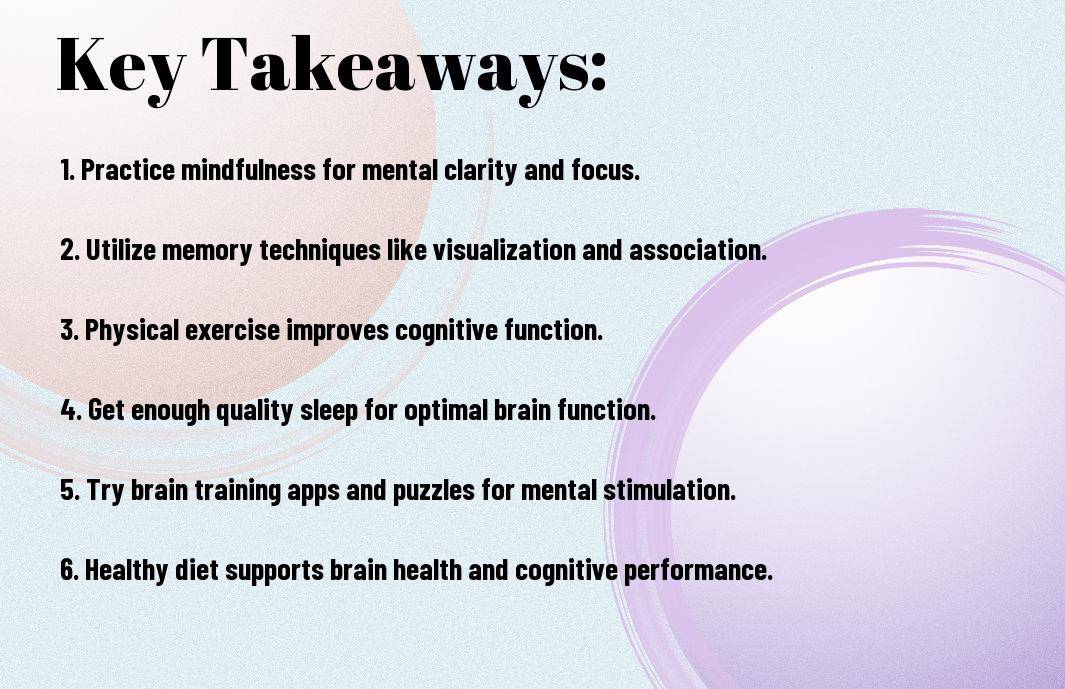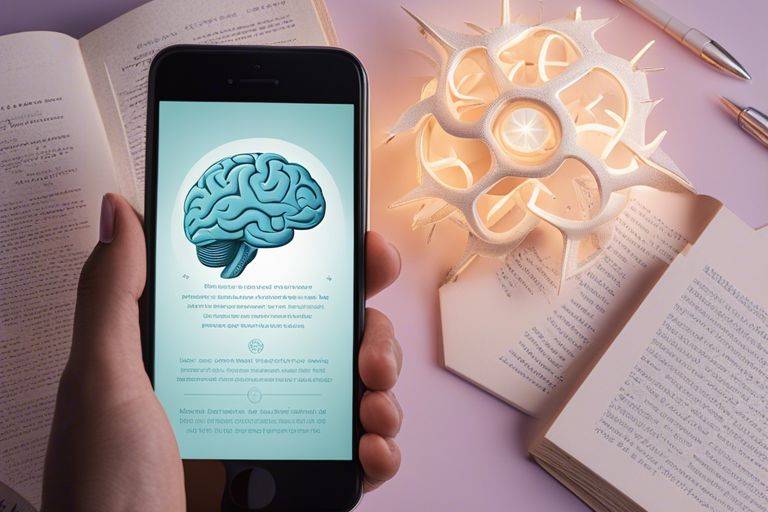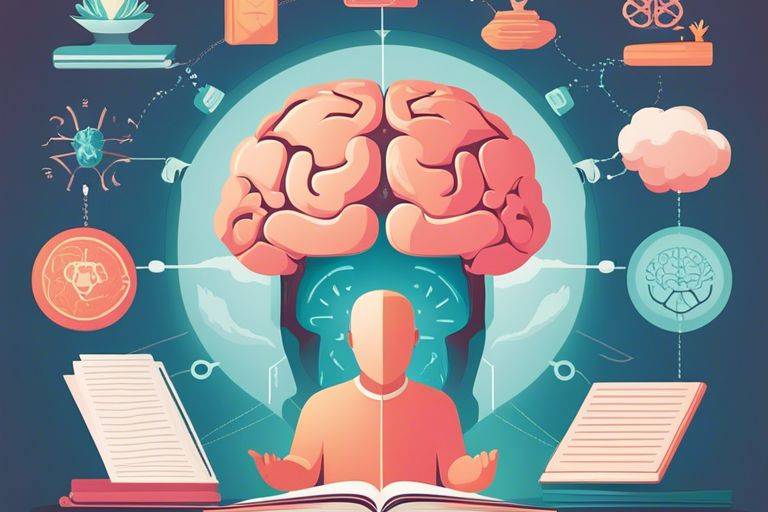Unlocking Your Mind
Over the years, researchers have uncovered various cognitive enhancement techniques that can help individuals improve their mental abilities and unleash their full potential. From simple lifestyle changes to advanced brain training exercises, there are numerous ways to unlock the power of your mind and boost your cognitive functions.
Key Takeaways:
- Practice Mindfulness: Engaging in mindfulness activities such as meditation can help improve focus and cognitive function.
- Challenge Your Brain: Continuously exposing your brain to new challenges and learning experiences can enhance cognitive abilities and maintain brain health.
- Get Adequate Sleep: Quality sleep is crucial for memory consolidation, problem-solving skills, and overall cognitive performance.
- Stay Physically Active: Regular exercise not only benefits physical health but also boosts cognitive function and reduces the risk of cognitive decline.
- Brain-Boosting Diet: Consuming a nutrient-rich diet with foods like fatty fish, blueberries, and leafy greens can support brain health and cognitive function.
- Socialize and Connect: Interacting with others, engaging in social activities, and building strong relationships can help prevent cognitive decline and improve mental well-being.
- Use Memory Techniques: Employ mnemonic devices, visualization, and association techniques to enhance memory retention and recall.

Foundations of Cognitive Functioning
One of the key aspects of understanding cognitive enhancement techniques is grasping the foundations of cognitive functioning. This involves delving into the intricacies of the brain’s anatomy and how it operates to facilitate various cognitive processes.
The Brain’s Anatomy and Its Functions
Foundations of cognitive functioning are rooted in the brain’s anatomy and its myriad functions. The brain is composed of different regions, each responsible for specific functions such as memory, attention, language, and more. The interconnected network of neurons facilitates communication within the brain and enables the execution of complex cognitive tasks.
Neuroplasticity: The Brain’s Ability to Adapt
On the topic of neuroplasticity, it refers to the brain’s remarkable ability to adapt and reorganize itself in response to experience, learning, and environmental factors. This phenomenon is crucial in shaping our cognitive abilities and plays a significant role in cognitive enhancement. By engaging in activities that stimulate neuroplasticity, individuals can enhance their learning capacity, memory retention, and overall cognitive function.
Another aspect of neuroplasticity worth highlighting is its implications for cognitive rehabilitation and recovery from brain injuries. Neuroplasticity can enable the brain to rewire itself and compensate for damaged areas, leading to improved cognitive function and quality of life for individuals. This phenomenon underscores the incredible potential of the brain to adapt and recover, highlighting the importance of leveraging neuroplasticity in cognitive enhancement strategies.

Behavioral Approaches to Cognitive Enhancement
All “Unlocking Your Brain’s Full Potential: Deep Techniques…” cognitive enhancement techniques involve harnessing the power of behavior. By understanding how our habits and time management impact cognitive functions, we can effectively unlock our brain’s full potential.
Habit Formation and Cognitive Improvement
The formation of habits plays a crucial role in cognitive enhancement. Creating a routine that includes activities like daily reading, meditation, or physical exercise can significantly boost cognitive functions. By performing these activities consistently, the brain adapts and strengthens neural connections, leading to improved focus, memory, and overall cognitive performance. Avoiding distractions and multitasking is also key to developing healthy habits that support cognitive enhancement.
Time Management Techniques for Optimal Brain Performance
For optimal brain performance, mastering time management is crucial. Prioritizing tasks based on importance and urgency can help maximize productivity and cognitive function. Implementing techniques such as the Pomodoro technique or time blocking can enhance focus and prevent mental fatigue. By efficiently allocating time for tasks and breaks, individuals can maintain high cognitive performance throughout the day.
This strategic approach to time management not only improves productivity but also allows individuals to work smarter, not harder, optimizing their brain’s capabilities for peak performance.
Dietary Influences on Cognitive Performance
Once again, we examine into the connection between what we eat and how well our brains function. Our diet plays a crucial role in shaping our cognitive abilities and overall brain health. By understanding the impact of different nutrients and hydration levels on cognition, we can unlock our mind’s full potential and enhance our mental performance.
Nutrients Essential for Brain Health
On the journey to optimal cognitive function, certain nutrients are non-negotiable for maintaining a healthy brain. Omega-3 fatty acids, found in fish and nuts, are vital for brain development and function. Antioxidants like vitamin E and C help protect brain cells from damage caused by free radicals. B vitamins, particularly B6, B12, and folic acid, play a crucial role in producing brain chemicals that affect mood and cognitive functions.
The Impact of Hydration on Cognition
Influences on our cognitive abilities go beyond food choices. Hydration levels can significantly impact brain function and cognitive performance. Even mild dehydration can impair short-term memory, focus, and decision-making abilities. It’s vital to stay adequately hydrated throughout the day to ensure optimal brain function.
Impact: Dehydration can lead to decreased cognitive function, affecting memory, attention, and mood. To optimize your brain’s performance, it’s vital to stay hydrated by consuming an adequate amount of water daily.
Foods and Supplements for Cognitive Enhancement
Foods rich in antioxidants, such as blueberries, dark leafy greens, and nuts, can help boost brain health and cognitive function. Additionally, supplements like omega-3 fatty acids, vitamin B complex, and ginkgo biloba have shown potential in improving memory, focus, and overall cognitive performance.
Brain: Choosing a diet rich in brain-boosting nutrients and staying hydrated is key to unlocking your mind’s potential. By incorporating these dietary influences into your lifestyle, you can enhance your cognitive performance and support long-term brain health.
Mental Exercise and Brain Training
Keep your mind sharp and agile by engaging in regular mental exercise and brain training activities. These techniques are important for unlocking your mind’s potential and improving cognitive function. By incorporating mental exercises into your daily routine, you can enhance your memory, focus, and overall brain health.
Puzzles and Games That Stimulate the Mind
The use of puzzles and games is an effective way to stimulate the mind and keep your brain active. Sudoku, crossword puzzles, and brain-training apps are excellent options to challenge different cognitive functions such as problem-solving, reasoning, and critical thinking. These activities can help you improve your memory retention and cognitive processing speed, ultimately boosting your overall mental acuity.
The Role of Continuous Learning in Cognitive Development
Brain health is closely linked to continuous learning and intellectual stimulation. Engaging in new activities, acquiring new skills, and pursuing hobbies that challenge your cognitive abilities can contribute to ongoing neuroplasticity, which is crucial for maintaining a healthy brain as you age. Lifelong learning not only enhances cognitive development but also helps in reducing the risk of cognitive decline and neurodegenerative diseases.
Training your brain through continuous learning can lead to improved memory, problem-solving skills, and overall cognitive function. It is important to challenge your brain with new information and tasks regularly to promote neural growth and connectivity. By incorporating a variety of learning experiences into your routine, you can keep your brain sharp, adaptable, and resilient against cognitive impairments.
Physical Activity and Its Impact on Cognition
The Connection Between Physical Exercise and Brain Function
Many studies have highlighted the significant relationship between physical activity and cognitive function. Engaging in regular exercise has been shown to have a positive impact on various aspects of brain health, including memory, concentration, and overall cognitive abilities. Physical activity stimulates the release of chemicals in the brain that promote the growth of new brain cells, improve neuronal connectivity, and protect brain cells from damage.
Exercise Regimens to Boost Cognitive Abilities
Brain exercise regimens can vary widely, from moderate aerobic activities like walking or swimming to more intense forms of exercise such as strength training or high-intensity interval training (HIIT). Regular physical activity has been linked to a reduced risk of cognitive decline and neurodegenerative diseases such as Alzheimer’s. Additionally, specific exercises that incorporate coordination, balance, and agility can further enhance cognitive function by challenging the brain to multitask and adapt to new movements.
It is imperative to find an exercise regimen that suits your preferences and fitness level to optimize the cognitive benefits. Whether it’s joining a group fitness class, taking up a sport, or simply incorporating daily walks into your routine, consistency is key to reaping the full rewards of physical activity on brain function. Consult with a healthcare professional or fitness expert to determine the most suitable exercise plan for your goals and abilities.

Technological Tools for Enhancing Cognition
Your mind is a powerful tool that can be optimized and harnessed with the help of technological advancements. In the quest for cognitive enhancement, a variety of tools and methods have emerged to push the limits of human potential. From apps and software designed for cognitive training to cutting-edge neurofeedback and brain-computer interface technologies, there are numerous ways to unlock your mind’s full capacity.
Apps and Software for Cognitive Training
Training your brain is important for boosting cognitive abilities such as memory, attention, and problem-solving skills. Apps and software specifically tailored for cognitive training offer interactive exercises and games that challenge your brain in various ways. These tools are designed to improve specific cognitive functions through consistent practice and can be easily integrated into your daily routine.
Neurofeedback and Brain-Computer Interface Technologies
Enhancing cognitive performance through neurofeedback and brain-computer interface technologies is on the cutting edge of cognitive enhancement. These tools provide real-time feedback on brain activity and can help individuals learn to regulate their brainwaves for improved focus, relaxation, and cognitive function. By utilizing advanced technology to directly interact with the brain, these methods hold great promise for enhancing cognitive abilities in ways previously thought impossible.
Cognition can be transformed through the utilization of these innovative technologies, offering an exciting glimpse into the future of cognitive enhancement. With the potential to significantly improve mental performance and overall well-being, neurofeedback and brain-computer interface technologies are revolutionizing the way we think about cognitive enhancement.
Mindfulness and Cognitive Enhancement
Despite the hustle and bustle of modern life, incorporating mindfulness into your routine can significantly enhance your cognitive abilities. Mindfulness is a practice that involves being fully present in the moment, acknowledging your thoughts, feelings, and surroundings without judgment. By honing in on this awareness, individuals can sharpen their focus, improve decision-making skills, and increase cognitive flexibility.
Understanding Mindfulness Meditation
Meditation: Mindfulness meditation is a technique that involves focusing on your breath, bodily sensations, or a particular object to cultivate awareness and clarity of the present moment. Through regular practice, individuals can enhance their ability to concentrate, reduce stress, and promote overall cognitive well-being.
Practical Mindfulness Exercises for Everyday Cognitive Boost
Exercises: Simple mindfulness exercises, such as mindful breathing, body scans, and mindfulness walks, can be integrated into your daily routine to boost cognitive function. These practices help to increase self-awareness, improve emotional regulation, and enhance problem-solving skills.
Cognitive: By incorporating practical mindfulness exercises into your everyday life, you can train your brain to operate more efficiently, lower stress levels, improve memory retention, and increase overall cognitive performance. Make a conscious effort to include these exercises in your daily regimen to unlock the full potential of your mind.
Challenges and Ethical Considerations
To Unlocking Your Brain’s Potential: Proven Strategies for …, we must first address the challenges and ethical considerations that come with cognitive enhancement techniques. The field of cognitive enhancement has sparked a debate on the ethical implications of using tools and practices to boost cognitive abilities.
The Debate Over Cognitive Enhancement
On the one hand, proponents argue that cognitive enhancement can lead to improved performance, increased productivity, and enhanced quality of life. They believe that utilizing techniques like brain training exercises, nootropics, or biofeedback can unlock the potential of the human mind. However, critics raise concerns about fairness, safety, and the unintended consequences of widespread cognitive enhancement. They worry that these techniques could create a divide between those who can afford enhancement tools and those who cannot, leading to inequalities in society.
Managing Expectations and Potential Risks
One crucial aspect of cognitive enhancement is managing expectations and understanding the potential risks involved. It is imperative for individuals to realize that cognitive enhancement techniques are not a magic solution and may not work the same for everyone. While some individuals may experience significant improvements in cognitive function, others may only see marginal benefits or even encounter negative side effects.
Understanding the limitations and risks associated with cognitive enhancement is key to making informed decisions about utilizing these techniques. It is important to approach cognitive enhancement with a balanced mindset, weighing the potential benefits against the possible risks to make the best choices for your cognitive well-being.
Final Words
Considering all points, unlocking your mind’s potential through cognitive enhancement techniques is a powerful tool for personal growth and development. By utilizing methods such as memory training, brain exercises, mindfulness, and healthy lifestyle habits, you can sharpen your mental faculties and tap into a limitless reserve of cognition. To explore deeper into enhancing your memory and unlocking your mind’s potential, check out Great Ways to Improve Memory: Unlock Your Mind’s Potential. Embrace the journey of cognitive enhancement and witness the transformative effects it can have on your overall well-being and success.
FAQ
Q: What is cognitive enhancement?
A: Cognitive enhancement refers to the improvement or augmentation of cognitive functions such as memory, attention, creativity, and problem-solving abilities.
Q: Why is unlocking your mind’s potential important?
A: Unlocking your mind’s potential can lead to increased productivity, better decision-making, enhanced learning capabilities, and overall mental well-being.
Q: What are some cognitive enhancement techniques?
A: Cognitive enhancement techniques include brain training exercises, meditation, proper nutrition, adequate sleep, and cognitive enhancers like nootropics.
Q: How does meditation help in cognitive enhancement?
A: Meditation helps improve focus, attention span, memory, and emotional regulation, all of which are crucial for cognitive enhancement.
Q: Can cognitive enhancers like nootropics be beneficial?
A: Nootropics, when used responsibly and under professional guidance, can enhance cognitive functions. However, their effects may vary from person to person.
Q: How important is nutrition for cognitive enhancement?
A: Nutrition plays a vital role in cognitive function. Consuming a balanced diet rich in brain-boosting nutrients like Omega-3 fatty acids and antioxidants can enhance cognitive abilities.
Q: How much sleep is necessary for cognitive enhancement?
A: Adequate sleep is crucial for cognitive enhancement. Most adults require 7-9 hours of quality sleep each night to support optimal brain function and cognitive performance.



